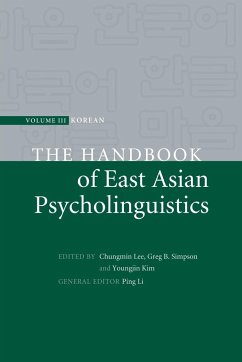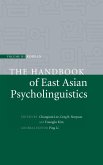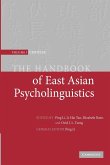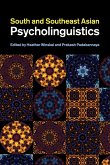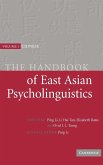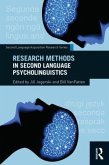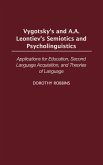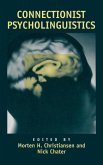Handbook of East Asian Psycholinguistics
Herausgeber: Lee, Chungming
Handbook of East Asian Psycholinguistics
Herausgeber: Lee, Chungming
- Broschiertes Buch
- Merkliste
- Auf die Merkliste
- Bewerten Bewerten
- Teilen
- Produkt teilen
- Produkterinnerung
- Produkterinnerung
This handbook presents a state-of-the-art discussion of the psycholinguistic study of Korean.
Andere Kunden interessierten sich auch für
![The Handbook of East Asian Psycholinguistics The Handbook of East Asian Psycholinguistics]() Chungmin Lee / Youngjin Kim / Greg B. Simpson (ed.) Ping . Li (General editor)The Handbook of East Asian Psycholinguistics224,99 €
Chungmin Lee / Youngjin Kim / Greg B. Simpson (ed.) Ping . Li (General editor)The Handbook of East Asian Psycholinguistics224,99 €![The Handbook of East Asian Psycholinguistics The Handbook of East Asian Psycholinguistics]() The Handbook of East Asian Psycholinguistics66,99 €
The Handbook of East Asian Psycholinguistics66,99 €![South and Southeast Asian Psycholinguistics South and Southeast Asian Psycholinguistics]() South and Southeast Asian Psycholinguistics42,99 €
South and Southeast Asian Psycholinguistics42,99 €![The Handbook of East Asian Psycholinguistics, Volume 1 The Handbook of East Asian Psycholinguistics, Volume 1]() Ping Li / Elizabeth Bates / Li Hai Tan / J. L. Tzeng (eds.)The Handbook of East Asian Psycholinguistics, Volume 1241,99 €
Ping Li / Elizabeth Bates / Li Hai Tan / J. L. Tzeng (eds.)The Handbook of East Asian Psycholinguistics, Volume 1241,99 €![Research Methods in Second Language Psycholinguistics Research Methods in Second Language Psycholinguistics]() Jill JegerskiResearch Methods in Second Language Psycholinguistics79,99 €
Jill JegerskiResearch Methods in Second Language Psycholinguistics79,99 €![Vygotsky's and A.A. Leontiev's Semiotics and Psycholinguistics Vygotsky's and A.A. Leontiev's Semiotics and Psycholinguistics]() Leslie JonesVygotsky's and A.A. Leontiev's Semiotics and Psycholinguistics101,99 €
Leslie JonesVygotsky's and A.A. Leontiev's Semiotics and Psycholinguistics101,99 €![Connectionist Psycholinguistics Connectionist Psycholinguistics]() Connectionist Psycholinguistics102,99 €
Connectionist Psycholinguistics102,99 €-
-
-
This handbook presents a state-of-the-art discussion of the psycholinguistic study of Korean.
Hinweis: Dieser Artikel kann nur an eine deutsche Lieferadresse ausgeliefert werden.
Hinweis: Dieser Artikel kann nur an eine deutsche Lieferadresse ausgeliefert werden.
Produktdetails
- Produktdetails
- Verlag: Cambridge University Press
- Seitenzahl: 660
- Erscheinungstermin: 6. Oktober 2014
- Englisch
- Abmessung: 229mm x 152mm x 35mm
- Gewicht: 940g
- ISBN-13: 9781107503786
- ISBN-10: 1107503787
- Artikelnr.: 43154957
- Herstellerkennzeichnung
- Libri GmbH
- Europaallee 1
- 36244 Bad Hersfeld
- gpsr@libri.de
- Verlag: Cambridge University Press
- Seitenzahl: 660
- Erscheinungstermin: 6. Oktober 2014
- Englisch
- Abmessung: 229mm x 152mm x 35mm
- Gewicht: 940g
- ISBN-13: 9781107503786
- ISBN-10: 1107503787
- Artikelnr.: 43154957
- Herstellerkennzeichnung
- Libri GmbH
- Europaallee 1
- 36244 Bad Hersfeld
- gpsr@libri.de
Introduction: advances in Korean psycholinguistics Chungmin Lee, Youngjin
Kim and Greg Simpson; 1. Acquisition of the subject and topic nominals and
markers in the spontaneous speech by young children in Korean Chungmin Lee;
2. The acquisition of argument structure and transitivity in Korean: a
discourse-functional approach Patricia M. Clancy; 3. Acquisition of case
markers and grammatical functions Gyeonghee No; 4. Do Korean children
acquire verbs earlier than nouns? You-kyung Chang-Song and Soyeong Pae; 5.
The acquisition of the placement of the verb in the clause structure of
Korean Chung-hye Han, Jeffrey Lidz and Julien Musolino; 6. Learning
locative verb syntax: a cross-linguistic experimental study Meesook Kim; 7.
Language-specific spatial semantics and cognition: developmental patterns
in English and Korean Soonja Choi; 8. The acquisition of negation in Korean
Judy Yoo-Kyung Baek and Kenneth Wexler; 9. The acquisition of Korean
numeral classifiers Kwee-Ock Lee and Sun-Young Lee; 10. Acquisition of
Korean reflexive anaphora Sook Whan Cho; 11. The Korean relative clause:
issues of processing and acquisition Jong Sup Jun; 12. The accessibility
hierarchy in Korean: head-external and head-internal relative clauses
Sookeun Cho and William O'Grady; 13. Development of functional categories
in child Korean Ho Han; 14. The acquisition of modality Chungmin Lee; 15.
The syntax of overmarking and kes in child Korean John Whitman; 16. Events
in passive development Youngjoo Lee; 17. Universal quantification in child
grammar Hye-Kyung Kang; 18. The acquisition of prosody in Korean Youngon
Choi and Reiko Mazuka; 19. Korean as a heritage language Terry Kit-fong Au
and Janet Sae Oh; 20. Maturational effects on L2 acquisition Dami Lee; 21.
Acquisition of English articles by Koreans Heejeong Ko, Tania Ionin and
Kenneth Wexler; 22. The acquisition of wanna contraction by adult Korean
learners of English Soo-Ok Kweon; 23. Phonological abilities of
Korean-English bilinguals Grace H. Yeni-Komshian; 24. Parameters and
languages in contact: an altered view of codeswitching Keumsil Kim Yoon;
25. Influence of socio-psychological categories in bilingual interaction M.
Agnes Kang; 26. Ontological concept versus shape in word learning from the
cross-linguistic point of view Hyeonjin Lee; 27. An overview of Korean sign
language Se-Eun Jhang; 28. Visual processing of Hangul, the Korean script
ChangHo Park; 29. English vowel spaces produced and perceived by Americans
and Koreans Byunggon Yang; 30. Morphological representation and processing
of Sino-Korean words Kwangoh Yi; 31. The role of phonology in word
recognition of Korean Hangul and Hanja Jeung-Ryeul Cho; 32. Lexical and
sublexical processes in Korean word recognition Greg B. Simpson and Hyewon
Kang; 33. Prosody in sentence processing Sun-Ah Jun; 34. Korean sentence
processing Youngjin Kim and Kwangill Choi; 35. Sentence processing and
memory representation in Korean Jae-Ho Lee and Sung-il Kim; 36.
Understanding complex sentences: memory constraints and information
structures Yoonhyung Lee and Peter Gordon; 37. Korean language processing
by ERP studies: word order effects Kyung Soon Shin and Jun Soo Kwon; 38.
Inferences during discourse comprehension in Korean Soyoung Suh Kim,
Jung-Mo Lee and Jae-Ho Lee; 39. Morpho-syntactic processing in Korean
aphasics Yu Mi Hwang, Kichun Nam and Myung-Yoon Kang; 40. Morpho-syntactic
processing of Korean-speaking adults with Broca's aphasia and children with
SLI Mina Hwang; 41. Comprehension deficits in Korean agrammatic aphasia
Miseon Lee; 42. Developmental reading disorders in Korean Jeesun Kim and
Chris Davis; 43. Individual differences in Korean language processing:
context-dependent processing of skilled readers in word ambiguity
resolution Byeong-Taek Lee; 44. The computational model of lexical and
morphological processing in Korean HeuiSeok Lim.
Kim and Greg Simpson; 1. Acquisition of the subject and topic nominals and
markers in the spontaneous speech by young children in Korean Chungmin Lee;
2. The acquisition of argument structure and transitivity in Korean: a
discourse-functional approach Patricia M. Clancy; 3. Acquisition of case
markers and grammatical functions Gyeonghee No; 4. Do Korean children
acquire verbs earlier than nouns? You-kyung Chang-Song and Soyeong Pae; 5.
The acquisition of the placement of the verb in the clause structure of
Korean Chung-hye Han, Jeffrey Lidz and Julien Musolino; 6. Learning
locative verb syntax: a cross-linguistic experimental study Meesook Kim; 7.
Language-specific spatial semantics and cognition: developmental patterns
in English and Korean Soonja Choi; 8. The acquisition of negation in Korean
Judy Yoo-Kyung Baek and Kenneth Wexler; 9. The acquisition of Korean
numeral classifiers Kwee-Ock Lee and Sun-Young Lee; 10. Acquisition of
Korean reflexive anaphora Sook Whan Cho; 11. The Korean relative clause:
issues of processing and acquisition Jong Sup Jun; 12. The accessibility
hierarchy in Korean: head-external and head-internal relative clauses
Sookeun Cho and William O'Grady; 13. Development of functional categories
in child Korean Ho Han; 14. The acquisition of modality Chungmin Lee; 15.
The syntax of overmarking and kes in child Korean John Whitman; 16. Events
in passive development Youngjoo Lee; 17. Universal quantification in child
grammar Hye-Kyung Kang; 18. The acquisition of prosody in Korean Youngon
Choi and Reiko Mazuka; 19. Korean as a heritage language Terry Kit-fong Au
and Janet Sae Oh; 20. Maturational effects on L2 acquisition Dami Lee; 21.
Acquisition of English articles by Koreans Heejeong Ko, Tania Ionin and
Kenneth Wexler; 22. The acquisition of wanna contraction by adult Korean
learners of English Soo-Ok Kweon; 23. Phonological abilities of
Korean-English bilinguals Grace H. Yeni-Komshian; 24. Parameters and
languages in contact: an altered view of codeswitching Keumsil Kim Yoon;
25. Influence of socio-psychological categories in bilingual interaction M.
Agnes Kang; 26. Ontological concept versus shape in word learning from the
cross-linguistic point of view Hyeonjin Lee; 27. An overview of Korean sign
language Se-Eun Jhang; 28. Visual processing of Hangul, the Korean script
ChangHo Park; 29. English vowel spaces produced and perceived by Americans
and Koreans Byunggon Yang; 30. Morphological representation and processing
of Sino-Korean words Kwangoh Yi; 31. The role of phonology in word
recognition of Korean Hangul and Hanja Jeung-Ryeul Cho; 32. Lexical and
sublexical processes in Korean word recognition Greg B. Simpson and Hyewon
Kang; 33. Prosody in sentence processing Sun-Ah Jun; 34. Korean sentence
processing Youngjin Kim and Kwangill Choi; 35. Sentence processing and
memory representation in Korean Jae-Ho Lee and Sung-il Kim; 36.
Understanding complex sentences: memory constraints and information
structures Yoonhyung Lee and Peter Gordon; 37. Korean language processing
by ERP studies: word order effects Kyung Soon Shin and Jun Soo Kwon; 38.
Inferences during discourse comprehension in Korean Soyoung Suh Kim,
Jung-Mo Lee and Jae-Ho Lee; 39. Morpho-syntactic processing in Korean
aphasics Yu Mi Hwang, Kichun Nam and Myung-Yoon Kang; 40. Morpho-syntactic
processing of Korean-speaking adults with Broca's aphasia and children with
SLI Mina Hwang; 41. Comprehension deficits in Korean agrammatic aphasia
Miseon Lee; 42. Developmental reading disorders in Korean Jeesun Kim and
Chris Davis; 43. Individual differences in Korean language processing:
context-dependent processing of skilled readers in word ambiguity
resolution Byeong-Taek Lee; 44. The computational model of lexical and
morphological processing in Korean HeuiSeok Lim.
Introduction: advances in Korean psycholinguistics Chungmin Lee, Youngjin
Kim and Greg Simpson; 1. Acquisition of the subject and topic nominals and
markers in the spontaneous speech by young children in Korean Chungmin Lee;
2. The acquisition of argument structure and transitivity in Korean: a
discourse-functional approach Patricia M. Clancy; 3. Acquisition of case
markers and grammatical functions Gyeonghee No; 4. Do Korean children
acquire verbs earlier than nouns? You-kyung Chang-Song and Soyeong Pae; 5.
The acquisition of the placement of the verb in the clause structure of
Korean Chung-hye Han, Jeffrey Lidz and Julien Musolino; 6. Learning
locative verb syntax: a cross-linguistic experimental study Meesook Kim; 7.
Language-specific spatial semantics and cognition: developmental patterns
in English and Korean Soonja Choi; 8. The acquisition of negation in Korean
Judy Yoo-Kyung Baek and Kenneth Wexler; 9. The acquisition of Korean
numeral classifiers Kwee-Ock Lee and Sun-Young Lee; 10. Acquisition of
Korean reflexive anaphora Sook Whan Cho; 11. The Korean relative clause:
issues of processing and acquisition Jong Sup Jun; 12. The accessibility
hierarchy in Korean: head-external and head-internal relative clauses
Sookeun Cho and William O'Grady; 13. Development of functional categories
in child Korean Ho Han; 14. The acquisition of modality Chungmin Lee; 15.
The syntax of overmarking and kes in child Korean John Whitman; 16. Events
in passive development Youngjoo Lee; 17. Universal quantification in child
grammar Hye-Kyung Kang; 18. The acquisition of prosody in Korean Youngon
Choi and Reiko Mazuka; 19. Korean as a heritage language Terry Kit-fong Au
and Janet Sae Oh; 20. Maturational effects on L2 acquisition Dami Lee; 21.
Acquisition of English articles by Koreans Heejeong Ko, Tania Ionin and
Kenneth Wexler; 22. The acquisition of wanna contraction by adult Korean
learners of English Soo-Ok Kweon; 23. Phonological abilities of
Korean-English bilinguals Grace H. Yeni-Komshian; 24. Parameters and
languages in contact: an altered view of codeswitching Keumsil Kim Yoon;
25. Influence of socio-psychological categories in bilingual interaction M.
Agnes Kang; 26. Ontological concept versus shape in word learning from the
cross-linguistic point of view Hyeonjin Lee; 27. An overview of Korean sign
language Se-Eun Jhang; 28. Visual processing of Hangul, the Korean script
ChangHo Park; 29. English vowel spaces produced and perceived by Americans
and Koreans Byunggon Yang; 30. Morphological representation and processing
of Sino-Korean words Kwangoh Yi; 31. The role of phonology in word
recognition of Korean Hangul and Hanja Jeung-Ryeul Cho; 32. Lexical and
sublexical processes in Korean word recognition Greg B. Simpson and Hyewon
Kang; 33. Prosody in sentence processing Sun-Ah Jun; 34. Korean sentence
processing Youngjin Kim and Kwangill Choi; 35. Sentence processing and
memory representation in Korean Jae-Ho Lee and Sung-il Kim; 36.
Understanding complex sentences: memory constraints and information
structures Yoonhyung Lee and Peter Gordon; 37. Korean language processing
by ERP studies: word order effects Kyung Soon Shin and Jun Soo Kwon; 38.
Inferences during discourse comprehension in Korean Soyoung Suh Kim,
Jung-Mo Lee and Jae-Ho Lee; 39. Morpho-syntactic processing in Korean
aphasics Yu Mi Hwang, Kichun Nam and Myung-Yoon Kang; 40. Morpho-syntactic
processing of Korean-speaking adults with Broca's aphasia and children with
SLI Mina Hwang; 41. Comprehension deficits in Korean agrammatic aphasia
Miseon Lee; 42. Developmental reading disorders in Korean Jeesun Kim and
Chris Davis; 43. Individual differences in Korean language processing:
context-dependent processing of skilled readers in word ambiguity
resolution Byeong-Taek Lee; 44. The computational model of lexical and
morphological processing in Korean HeuiSeok Lim.
Kim and Greg Simpson; 1. Acquisition of the subject and topic nominals and
markers in the spontaneous speech by young children in Korean Chungmin Lee;
2. The acquisition of argument structure and transitivity in Korean: a
discourse-functional approach Patricia M. Clancy; 3. Acquisition of case
markers and grammatical functions Gyeonghee No; 4. Do Korean children
acquire verbs earlier than nouns? You-kyung Chang-Song and Soyeong Pae; 5.
The acquisition of the placement of the verb in the clause structure of
Korean Chung-hye Han, Jeffrey Lidz and Julien Musolino; 6. Learning
locative verb syntax: a cross-linguistic experimental study Meesook Kim; 7.
Language-specific spatial semantics and cognition: developmental patterns
in English and Korean Soonja Choi; 8. The acquisition of negation in Korean
Judy Yoo-Kyung Baek and Kenneth Wexler; 9. The acquisition of Korean
numeral classifiers Kwee-Ock Lee and Sun-Young Lee; 10. Acquisition of
Korean reflexive anaphora Sook Whan Cho; 11. The Korean relative clause:
issues of processing and acquisition Jong Sup Jun; 12. The accessibility
hierarchy in Korean: head-external and head-internal relative clauses
Sookeun Cho and William O'Grady; 13. Development of functional categories
in child Korean Ho Han; 14. The acquisition of modality Chungmin Lee; 15.
The syntax of overmarking and kes in child Korean John Whitman; 16. Events
in passive development Youngjoo Lee; 17. Universal quantification in child
grammar Hye-Kyung Kang; 18. The acquisition of prosody in Korean Youngon
Choi and Reiko Mazuka; 19. Korean as a heritage language Terry Kit-fong Au
and Janet Sae Oh; 20. Maturational effects on L2 acquisition Dami Lee; 21.
Acquisition of English articles by Koreans Heejeong Ko, Tania Ionin and
Kenneth Wexler; 22. The acquisition of wanna contraction by adult Korean
learners of English Soo-Ok Kweon; 23. Phonological abilities of
Korean-English bilinguals Grace H. Yeni-Komshian; 24. Parameters and
languages in contact: an altered view of codeswitching Keumsil Kim Yoon;
25. Influence of socio-psychological categories in bilingual interaction M.
Agnes Kang; 26. Ontological concept versus shape in word learning from the
cross-linguistic point of view Hyeonjin Lee; 27. An overview of Korean sign
language Se-Eun Jhang; 28. Visual processing of Hangul, the Korean script
ChangHo Park; 29. English vowel spaces produced and perceived by Americans
and Koreans Byunggon Yang; 30. Morphological representation and processing
of Sino-Korean words Kwangoh Yi; 31. The role of phonology in word
recognition of Korean Hangul and Hanja Jeung-Ryeul Cho; 32. Lexical and
sublexical processes in Korean word recognition Greg B. Simpson and Hyewon
Kang; 33. Prosody in sentence processing Sun-Ah Jun; 34. Korean sentence
processing Youngjin Kim and Kwangill Choi; 35. Sentence processing and
memory representation in Korean Jae-Ho Lee and Sung-il Kim; 36.
Understanding complex sentences: memory constraints and information
structures Yoonhyung Lee and Peter Gordon; 37. Korean language processing
by ERP studies: word order effects Kyung Soon Shin and Jun Soo Kwon; 38.
Inferences during discourse comprehension in Korean Soyoung Suh Kim,
Jung-Mo Lee and Jae-Ho Lee; 39. Morpho-syntactic processing in Korean
aphasics Yu Mi Hwang, Kichun Nam and Myung-Yoon Kang; 40. Morpho-syntactic
processing of Korean-speaking adults with Broca's aphasia and children with
SLI Mina Hwang; 41. Comprehension deficits in Korean agrammatic aphasia
Miseon Lee; 42. Developmental reading disorders in Korean Jeesun Kim and
Chris Davis; 43. Individual differences in Korean language processing:
context-dependent processing of skilled readers in word ambiguity
resolution Byeong-Taek Lee; 44. The computational model of lexical and
morphological processing in Korean HeuiSeok Lim.

